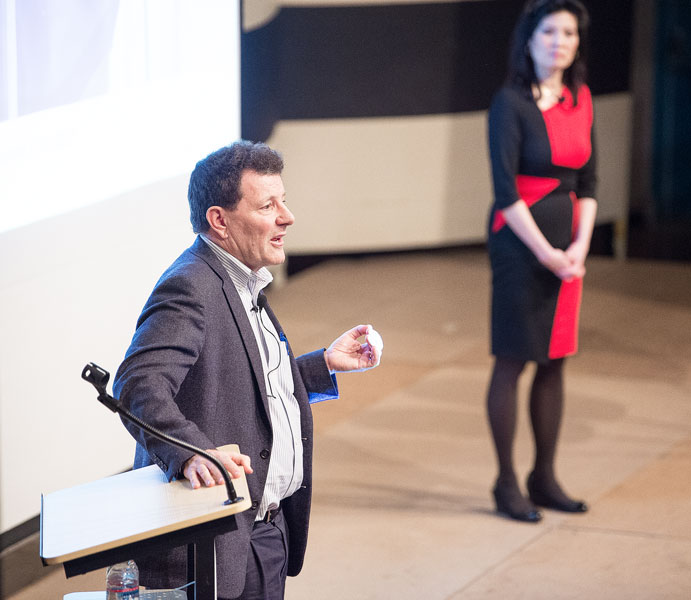Kristof: We’re losing a generation to drugs, alcohol, neglect
When I drive through Yamhill and Carlton these days, I see so much that has changed over the decades. The old shacks from my childhood, lacking electricity and plumbing, are gone. Today, wineries bring in tourists from across the country.
Yet as I drive along Highway 47, I also think of my old classmate, Farlan Knapp, who lived near me in Cove Orchard, half way between Yamhill and Gaston. Farlan would jump on the No. 6 school bus each morning, right after me, along with his brothers, Zealan, Nathan and Keylan, and his sister, Rogena.
They were rambunctious, optimistic kids. Their family represented the American dream.
Farlan’s parents hadn’t completed grade school, but his dad had a good union job laying pipe, and his mom had a decent job at a nearby filbert orchard. They had saved enough to buy their own home, and when Farlan turned 16, the family scrimped and saved and bought him a Ford Mustang.
Boy, we were all jealous!
Yet as Yamhill County has prospered, many of its people have struggled, and I see that in the kids who were on the No. 6 bus with me. About one-quarter of them have died from drugs, alcohol, suicide and related pathologies.
Farlan died of liver failure associated with drug and alcohol abuse. It spiraled out of control when he was unfairly fired from his job.
Zealan died in a house fire while passed out drunk. Nathan blew himself up cooking meth. Rogena died of hepatitis linked to injectable drugs.
Keylan survived mostly because he spent 13 years in the Oregon State Penitentiary. The county and state have, I’m afraid, spent large sums locking up my classmates.
There were, of course, many other kids who flourished.
I look at the children in my 1977 Yamhill Carlton High School yearbook, and the students who were in the National Honor Society did great. Those who joined the military mostly thrived. The Mormon kids did well, for the Mormon Church was just about the only local institution that provided immunity from mayhem.
But so many kids, especially those who dropped out of high school, struggled.
When the glove factory in Carlton closed, when the local canneries, sawmills and factories shut or trimmed employment, when good union jobs disappeared, working class men became particularly vulnerable. Too often, they self-medicated with meth as it poured through the region, or with alcohol or opioids.
They were lonely and socially isolated. Low incomes and drug convictions made them even less employable and marriageable.
This is a Yamhill story, but it’s also an American story. Across the country, the working class, often defined as those without a college degree, has imploded.
Even in times of enormous prosperity, the bottom half of the labor force has been left behind. Average hourly wages were actually lower in 2018 ($22.65) than they had been 35 years earlier in 1973 ($23.68 in today’s prices), according to Bureau of Labor Statistics data.
If the 1968 federal minimum wage had kept pace with inflation and productivity, it would now be more than $22 an hour. Instead, it’s $7.25 an hour.
Economic struggles help explain the mental health crisis and self-medication in Yamhill — but also in Maine, in Kentucky, in Texas.
Since my wife, Sheryl WuDunn, and I wrote “Tightrope,” so many people have approached us and said something like: “I’m from a small town, too, and it’s just like Yamhill.” That’s why we lose more Americans every two weeks from drugs, alcohol and suicide than we lost in 18 years of war in Afghanistan and Iraq combined.
These issues don’t get the attention they deserve, and one reason is that they’re somewhat invisible.
Any analogy with the Great Depression is in one sense absurd: During the Depression, economic output collapsed, while now the pie is growing, corporate profits are soaring and unemployment is low.
If you’re a banker in Manhattan or a computer scientist in San Francisco — even a lawyer in McMinnville — these struggles are incomprehensible. You probably don’t know anyone who is wrestling with addiction.
In Mac, you may see my old neighbor, Mike Stepp, now homeless, who camps out in the park by the library. But you’re unlikely to stop to chat with him.
This invisibility is an obstacle to addressing these problems.
We sometimes think that working class struggles are an inevitable consequence of automation and globalization, but that’s not quite right. Europe and Canada faced similar issues, but their life expectancy isn’t falling like ours.
We looked at what happened when auto workers were laid off in the 2008-09 recession in Detroit, and just across the Canadian border in Windsor, Ontario.
The laid-off American workers received extended unemployment benefits, but the Canadians also kept their health care and received critical help with job retraining. Some entered nursing school. As a result, the laid-off Canadians are doing better than the laid-off Americans.
So there are solutions to these problems.
Job training and retraining would help not only workers, but also corporate America. Early childhood education would help kids and also help their parents hold jobs by providing high quality day care. Drug treatment is a no-brainer: In our book, we describe how Provoking Hope, based in McMinnville, helped some old friends start over.
More broadly, we also need a new ethic less focused on pointing fingers and more on offering helping hands. We call it a “morality of grace.”
It would do more to support at-risk children, keeping them in school and helping them get a college education. It would acknowledge that people screw up, and it would give them second chances. It would recognize personal responsibility but also our collective responsibility.
When I was growing up in Yamhill, a friend named Ann was growing up in the Southern Oregon community of Ashland. Ann was smart and talented, but was the eldest of five children in a family where no one had ever gone to college, and she wasn’t planning to either.
Then, in the spring of her senior year, her English teacher, Hattie Converse, stopped Ann in the hallway to ask where she was going to college. Ann explained she wasn’t going.
Mrs. Converse led Ann to the office, handed her application forms to the University of Oregon and pretty much ordered her to apply.
After some wavering, Ann did apply. She was accepted and won a scholarship from a local foundation.
She worked hard in the cafeteria and as a hotel maid, accepting all jobs to work her way through the University of Oregon to earn a degree in journalism. After college, she took a news job at a television station in Medford.
That was Ann Curry, who eventually rose to become anchor of the Today Show. There are so many other Anns out there as well, except that today, tuition is much more expensive, so it’s so much harder to work one’s way through college.
I think of Ann’s success when I drive along Highway 47 and remember Farlan, Zealan, Nathan and Rogena Knapp.
America’s greatest untapped resource isn’t its oil reserves or its forests or its patents, but its people. We squandered too much of that talent, and we’re unnecessarily burying that talent in cemeteries across the country today.
That’s why we wrote “Tightrope” — in hope we can have smarter policies that provide more opportunities to the next generation of kids on the No. 6 school bus.











Comments
RobsNewsRegister
Great job bringing attention to an oft neglected issue. I'm in shock but about what I hear has already happened with young men my kids and nephews went to school with - many are addicts, incarcerated, or even dead. I've also seen it with friend's kids. If you looks at the metrics (educational achievement, drugs, suicide, incarceration etc..) our boys are getting hammered.
If we don't get on-the-ball the problem it could get far worse - for instance, what happens the day automated trucks replaces the 3 million or so truck drivers in the country [they are closer than you think - 5G and AI could enable the tech]? Demographically, like many professions recently automated or outsourced, this has an outsized impact on men. What will they do?